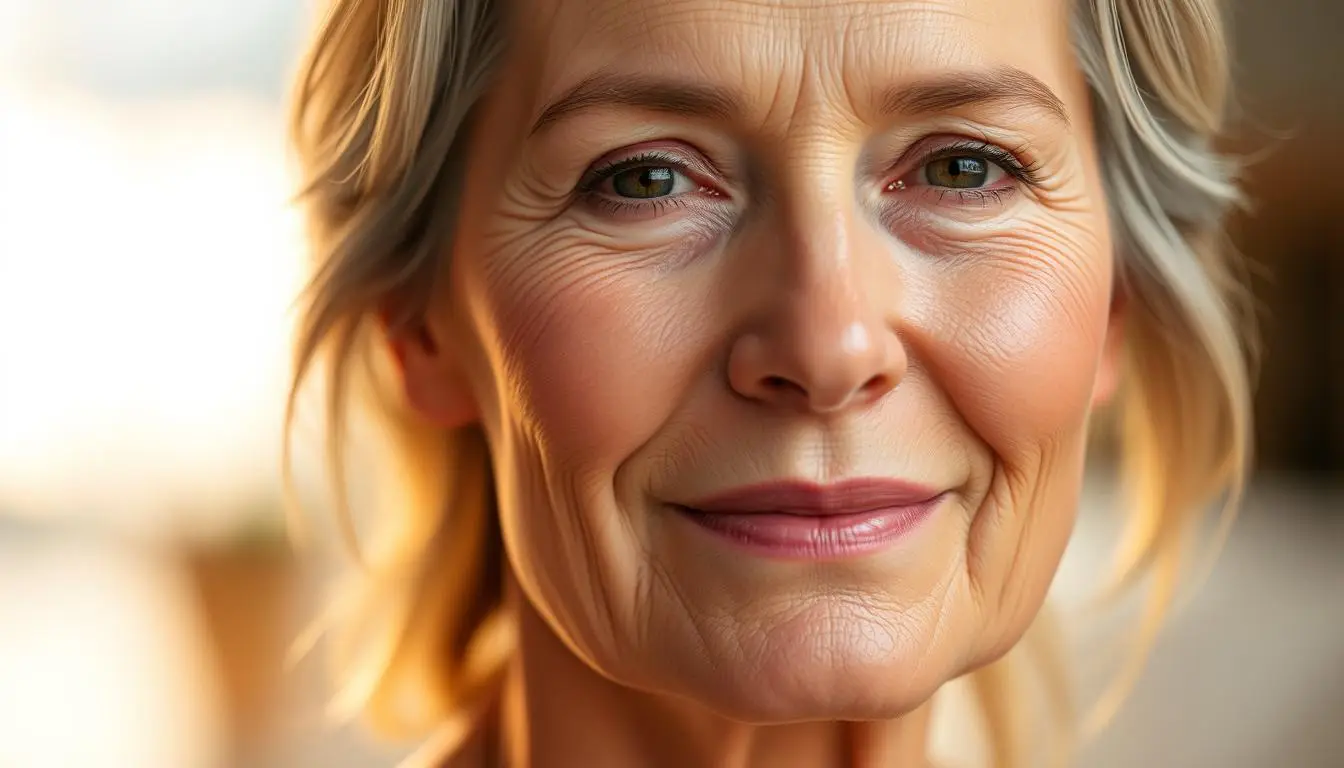Did you know that just 20 minutes in nature can lower stress hormones? Midlife women face many challenges like hormonal changes, work, and family. Nature becomes key for their mental health and emotional strength.

Nature is a calm escape from daily stress. It brings calm, perspective, and renewal. Ecotherapy and green therapy help midlife women use nature’s healing power for their mental health.
Key Takeaways
- Nature has a profound impact on midlife women’s mental health and emotional wellbeing
- Midlife challenges such as hormonal changes and work-life balance can strain mental health
- Spending time in nature reduces stress, improves mood, and enhances cognitive function
- Ecotherapy and green therapy harness nature’s healing power for therapeutic benefits
- Incorporating nature into daily life through mindfulness practices and biophilic design supports mental wellbeing
The Connection Between Nature and Mental Well-being
As midlife women face life’s changes, nature can help a lot. Being in restorative environments like forests or parks can greatly improve your mood. Even your own garden can make a big difference.
Many studies show that nature lowers stress and helps you relax. The calm sounds and smells of nature soothe your mind and body. Activities like hiking or gardening can bring you peace.
Nature also helps you think and feel better. It gives you time to reflect and be mindful. This can help you understand your feelings and needs better.
Our love for nature, called biophilia, is deep. Humans and nature have always been connected. Being in nature calms your nervous system, making you feel at peace.
“In every walk with nature, one receives far more than he seeks.” – John Muir
By making nature a part of your life, midlife women can feel better. A walk in the park or gardening can improve your mood and life quality.
How Midlife Challenges Affect Women’s Mental Health
Women in midlife often face unique challenges that affect their mental health. They deal with hormonal changes and balancing work and family life. It’s important to understand these challenges to help manage stress and improve mental health.

Hormonal Changes and Emotional Upheavals
One big challenge is hormonal shifts during perimenopause and menopause. These changes can cause hot flashes, mood swings, and anxiety. It’s tough because these changes happen during big life events, like kids leaving home or caring for aging parents.
Balancing Career, Family, and Personal Life
Midlife women juggle work, family, and personal goals. This can be very stressful and lead to burnout. Finding time for themselves and their interests is hard, adding to the emotional strain.
To tackle midlife challenges, women need to focus on their mental health. They should seek support, do things that reduce stress, and be kind to themselves. By doing so, they can face these challenges with more strength and grace.
The Benefits of Spending Time in Nature for Midlife Women
As a midlife woman, you might feel overwhelmed with responsibilities. Nature offers a calm escape, boosting your health and happiness. It’s a chance to relax and find peace.
Nature is great at reducing stress and promoting relaxation. Being in nature calms your body and mind. The sounds and smells of nature help you feel more relaxed and centered.
Improved Mood and Emotional Regulation
Spending time in nature also improves your mood and emotional balance. Nature’s beauty lifts your spirits. The colors, smells, and warmth of the sun make you feel happy and content.
Nature boosts serotonin, the happiness hormone. This helps you stay positive and feel well.
Enhanced Cognitive Function and Clarity
Nature also sharpens your mind and improves focus. Away from technology, your mind can rest and clear. Nature helps you stay present and focused, improving your thinking and problem-solving skills.
Make nature a part of your life to boost your mental health. A walk in the park, a hike, or sitting in your garden can help. Nature supports you through midlife’s challenges, making you stronger and more resilient.
Nature-Based Interventions for Mental Health
Midlife women often face unique challenges that affect their mental health. Nature-based interventions offer a powerful way to support their well-being. These approaches use nature’s healing powers to help relax, reduce stress, and improve mental health.
Ecotherapy is one such intervention. It involves doing therapeutic activities outdoors. This can include walking in nature, gardening, or simply sitting outside. Nature helps women feel grounded, find perspective, and connect with something bigger than themselves.
Green therapy uses plants and gardening to boost mental health. Activities like planting and caring for a garden give a sense of purpose and mindfulness. A study in the International Journal of Environmental Research and Public Health showed these programs improve mood and self-esteem.
Therapeutic landscapes, like healing gardens or nature trails, also help. These spaces are designed to bring peace and calm. They offer a place for reflection and finding inner peace.
| Nature-Based Intervention | Benefits for Mental Health |
|---|---|
| Ecotherapy | Stress reduction, grounding, perspective |
| Green Therapy | Purpose, accomplishment, mindfulness |
| Therapeutic Landscapes | Solace, reflection, inner peace |
Adding nature-based interventions to mental health care helps midlife women. They learn to face challenges with resilience and inner strength. Nature becomes a powerful tool for emotional well-being during this life stage.
Ecotherapy and Green Therapy: Harnessing Nature’s Healing Power
In today’s fast world, we often forget nature’s healing power. Ecotherapy and green therapy use nature to help our mental health. By spending time in green spaces and doing nature activities, we can find emotional healing and stress relief.
Ecotherapy, or nature therapy, includes many practices that connect us with nature. It includes walks in forests and gardening in healing gardens. These activities help us feel better by using our natural love for nature. Ecotherapy helps midlife women find peace and energy in tough times.
Forest Bathing and Its Therapeutic Effects
Forest bathing, or shinrin-yoku, is a popular ecotherapy practice from Japan. It involves being in a forest, using all your senses to feel nature’s healing. Studies show it lowers stress, improves mood, and boosts the immune system.

Being in a forest is like a calming symphony. The sounds, smells, and sights relax your mind and soothe your soul. It helps you forget daily worries and find peace and clarity.
Therapeutic Landscapes and Gardens
Therapeutic landscapes and gardens also use nature to heal. These outdoor spaces are made to help our mental health and reduce stress. Healing gardens have water features, plants, and places to sit, inviting us to connect with nature.
Visiting a therapeutic garden is very healing for midlife women. Whether walking, gardening, or meditating, nature surrounds us. It helps us stay present and find peace in our busy lives. Spending time in these spaces builds inner peace and emotional strength.
Incorporating Nature into Your Daily Life
As a midlife woman, you might long for a closer bond with nature. Adding nature to your daily routine can greatly improve your mental health. It helps you find peace and balance. Here are some easy ways to let nature’s healing power into your life.

Outdoor Mindfulness Practices
Outdoor mindfulness is a great way to connect with nature. It helps you stay present. Try these activities:
- Take a mindful walk in a nearby park or green space, focusing on your senses and the natural surroundings.
- Practice yoga or meditation in a peaceful outdoor setting, allowing the gentle breeze and birdsong to guide your breath.
- Create a small outdoor ritual, such as tending to a garden or enjoying your morning coffee while observing the changing seasons.
Creating a Restorative Home Environment with Biophilic Design
Biophilic design brings nature into your home. It makes your living space calm and connected to nature. Here are some ideas:
| Design Element | Benefits | Examples |
|---|---|---|
| Indoor plants | Improve air quality and reduce stress | Snake plants, peace lilies, pothos |
| Natural materials | Create a sense of warmth and comfort | Wood, stone, natural fibers |
| Natural light | Boosts mood and regulates circadian rhythms | Large windows, skylights, sheer curtains |
| Nature-inspired colors | Evoke feelings of tranquility and harmony | Earthy tones, blues, greens |
By adding nature to your life through mindfulness and biophilic design, you can make a peaceful space. This space supports your mental health. Let nature’s beauty and wisdom guide you to a more balanced life.
How Nature Impact on Midlife Women Mental Health
Midlife women face many challenges, but nature offers a powerful way to improve mental health. Being in nature helps build emotional strength. It shows how deeply connected we are to the natural world.

Being outdoors can lower stress and help with anxiety and depression. Activities like walking in forests or gardening can calm the mind and body. Nature has a soothing effect on us.
For midlife women, nature is a break from daily life. It helps them disconnect from technology and find peace. This is essential for those dealing with many responsibilities and hormonal changes.
Nature also helps women connect with others. Joining hiking groups or yoga classes outdoors can build friendships. These connections are key for emotional health and fighting loneliness.
Nature is good for more than just mental health. It also boosts physical health. Being outside helps with sleep, vitamin D, and a strong immune system. Activities like hiking or gardening improve heart health and fitness.
By making nature a part of their lives, midlife women can feel more emotionally strong. Whether it’s a daily walk or a weekend in the mountains, nature’s healing power is transformative.
Overcoming Barriers to Connecting with Nature
As a midlife woman, you might face nature barriers that make it hard to enjoy the outdoors. Time constraints and limited access to green spaces can be big hurdles. But, with a little creativity and determination, you can find ways to bring nature into your life.
Time Constraints and Prioritizing Self-Care
Time is often a big barrier to enjoying nature. Work, family, and other duties can fill up your schedule. Yet, self-care is vital. By making time for nature, you can lower stress, boost your mood, and improve your life quality.
To beat time constraints, try to fit nature into your routine. For instance:
- Take a short walk in a nearby park during your lunch break
- Practice outdoor mindfulness exercises, such as deep breathing or meditation, for a few minutes each day
- Engage in gardening or tending to indoor plants as a relaxing hobby
Accessibility and Finding Green Spaces in Urban Areas
In urban areas, finding nature can be tough. The city’s concrete and busy streets often hide green spaces. But, even in the busiest cities, there are green spots waiting to be found.
To find green spaces near you, consider:
- Researching local parks, community gardens, and nature reserves
- Joining local hiking or outdoor recreation groups to explore nearby natural areas
- Utilizing rooftop gardens, pocket parks, or green walls in urban settings
- Creating a balcony or windowsill garden to bring nature into your living space
FAQ
Q: How does physical activity impact menopausal symptoms in women?
A: Engaging in regular physical activity can help alleviate symptoms in midlife women, including vasomotor symptoms like hot flashes and night sweats. It’s like giving menopause a kick in the shins while boosting your mood!
Q: What does the data availability say about physical activity for perimenopausal women?
A: The data availability from systematic reviews suggests that perimenopausal women who maintain an active lifestyle may experience fewer depressive symptoms and improved overall health outcomes. It’s like having a secret weapon against those pesky menopausal blues!
Q: Can physical activity help with sleep disturbances during the menopause transition?
A: Absolutely! Physical activity can enhance sleep health and reduce sleep disturbances commonly reported by women during the menopausal transition. So, why not trade those restless nights for some invigorating workouts?
Q: Is there any systematic review that supports the role of physical activity in reducing depressive symptoms?
A: Yes, a systematic review and meta-analysis have shown that regular physical activity significantly reduces depressive and anxiety symptoms in perimenopausal and postmenopausal women. Think of it as a double whammy for mental and physical health!
Q: How does body mass index relate to physical activity during menopause?
A: Body mass index (BMI) can influence health outcomes during menopause. Engaging in physical activity can help manage body weight, which in turn might help mitigate some menopausal symptoms. It’s all about keeping that BMI in check while you kick butt!
Q: What health conditions can be improved by physical activity during menopause?
A: Physical activity can combat various health conditions associated with menopause, including mood disorders like major depressive disorder. So, lace up those sneakers and let’s fend off those midlife health issues!
Q: Are there any creative commons resources available for understanding the role of physical activity in menopause?
A: Indeed! There are numerous open access articles and studies under creative commons licenses that provide valuable insights about physical activity and its effects on menopausal women. Just remember to give credit where credit is due – a creative commons attribution goes a long way!
Q: What should women during the menopausal transition keep in mind about their physical activity?
A: Women transitioning through menopause should remember that consistency is key! Tailoring physical activity to your personal preferences and needs can help manage menopausal symptoms and keep mood disorders at bay. It’s about finding joy in movement!
Conclusion
We’ve looked at how nature affects the mental health and emotional wellbeing of midlife women. As you face life’s changes, connecting with nature can help a lot. It boosts your resilience, lowers stress, and improves your life quality.
Try activities like ecotherapy, forest bathing, and therapeutic landscapes to use nature’s healing. Even small actions, like practicing mindfulness outdoors or adding nature-inspired designs at home, can help a lot.
Remember, taking care of your mental health is essential, not a luxury. By focusing on self-care and nature, you can find balance, clarity, and peace. Let nature’s beauty and wisdom help you through this important time in your life.








